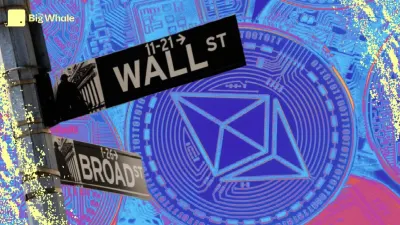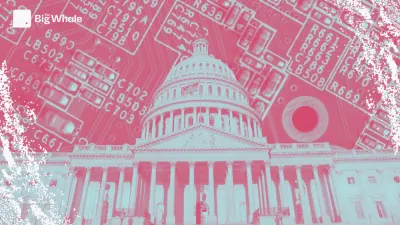The Big Whale: You're the boss of a major exchange platform, but we don't know much about you. Who are you?
I have a rather atypical profile. I started out as a chartered accountant in the 2000s before joining PayPal, where I became head of compliance. I then joined eBay Europe to oversee the whole payment side.
Not many people know this, but I first worked at Bitstamp in 2014. At the time it was still a small start-up in a garage. There were about ten of us. I was in charge of compliance.
I left the company in 2016 after we obtained our first licence in Luxembourg. I came back in 2021, and for the past year I've been the CEO.
Bitstamp started in Europe, but you've been constantly expanding your scope. To what extent?
We are based in Luxembourg for our historical activities in Europe, but we also have a presence in the United States and Singapore.
Our main advantage over the competition is the number of licences and regulatory registrations we have. We have 51, in other words we are the most regulated platform in the world.
How many users do you have?
About four million retail customers. Europe represents 70% of our business, the United States 15%, and the rest of the world another 15%.
And in terms of employees?
Bitstamp has just over 400 employees. But, as the head office is in Luxembourg, it's in Europe that the bulk of the teams are concentrated with 360 people, between Luxembourg, London (read our report on the spot) , Amsterdam and Slovenia, which is also the cradle of Bitstamp and the country of origin of its two founders.
After more than ten years of existence, Bitstamp remains unknown to many people. Why is that? Haven't you missed something from a marketing point of view?
That's a very good question. In the early years, Bitstamp represented 25% of the market, but we've lost a bit of ground since then. Why have we lost ground? Because we opted for compliance rather than unbridled growth and marketing.
One of our priorities has been to put in place the best "KYC" (Know your customer) systems. It's less profitable, but it's essential.
Other competitors, such as OKX, Huobi or Binance, have not made this choice, which has enabled them to grow much faster. But we know what the risks of such a policy are...
How do you analyse Binance's growth?
They have been very strong since their launch in 2017-2018, but we don't share the same values. They have obviously played an important role in the adoption of cryptos, but they are not the ideal player to represent the sector, especially with regard to the institutional clientele (corporates, banks, funds) that we are increasingly targeting.
For what reasons?
Simply because of their reputation. Between their concerns about the fight against money laundering and their difficulty in keeping their banking partners, Binance doesn't have an excellent image...
We have far fewer customers than them (Binance claims over 100 million), but our situation is stable. A third of our 400 employees work on compliance. We are a trusted player, particularly for institutional clients.
You are still well behind them. Will you be able to close this gap?
If we take a step back, our policy has enabled us to avoid all the pitfalls. We have not been exposed to FTX or Genesis, which is an essential point for institutional clients who want to work with serious crypto players.
Today, we work with many traditional players such as the British neo-bank Revolut, the Stuttgart Stock Exchange, LVH in Estonia or Swissquote in Switzerland.
What do you do with these companies?
We enable them to offer crypto to their customers via our white-label "Bitstamp-as-a-Service" solution. Around twenty establishments are now working with us. Other announcements are coming in from the United States, Latin America and Europe.
Would you move away from retail customers to focus on institutional ones?
It's very important to retain a retail customer base. They provide ongoing liquidity. The aim is to stay on a 50/50 basis.
What is your financial situation?
Everything is going well. Unlike Coinbase or Kraken, we haven't had to lay off any of our staff. When you have as much experience as we do, and several crypto winters, you know that you have to remain cautious.
We have recorded sales of €220 million in 2021 for a net profit of €70 million after tax. Our 2022 accounts are currently being audited by EY.
With Coinbase, we are also the only two exchange platforms in the world to be audited by a Big Four firm.
Who's behind Bitstamp?
90% of us are owned by NXMH, a South Korean private equity fund that also bought the South Korean exchange platform Korbit. The final 10% is owned by the US hedge fund Pantera.
Where are you registered in Europe?
We have had a digital asset service provider (DASP) registration in France since February 2023, but our first European licence dates back to 2016.
It's a payment institution licence that we obtained in Luxembourg and which we 'passported' throughout the European Union. We also have the equivalent of PSAN in Luxembourg, the Netherlands, Italy and Spain.
And in the rest of the world?
We have 42 licences for the US market and our local headquarters are in New York. We also have other projects, particularly in the Asia-Pacific region and North America.
Many crypto companies started out in France to register in Europe. Why did you choose Luxembourg?
When I first joined Bitstamp in 2014, we toured Europe to register as a crypto exchange platform. We went to Germany, France, the UK, etc.
Finally; the only country able to offer us anything at the time was Luxembourg. That's why we set up our head office there.
You're French. How do you see France's place in the European crypto ecosystem?
For us, it's an important market. There are a lot of innovations and important companies for the sector, particularly with the regulatory framework which is, whatever people think, quite good. 3-4 years ago, I thought that Germany was further ahead, but the French authorities have shown that they can be at the cutting edge on the subject.
Bitstamp is present just about everywhere in the world. How do you see the European market?
At Bitstamp, we are supporters of regulation. As long as regulation is clear, it creates confidence among consumers and encourages greater adoption.
The United States took this route more quickly than Europeans several years ago, with BitLicence for example. In Europe, each country had its own vision on the subject, it was very fragmented. For an exchange platform like ours, it was difficult to have a global approach.
But Europe is going to catch up and even overtake us thanks to the MiCA regulation, which will harmonise everything. It's true that small start-ups are going to find it hard to get over the hurdle, but that's the price we have to pay to protect and reassure customers.
You chose to apply for PSAN registration in France and not for authorisation, which will nevertheless be compulsory when MiCA comes into force (between 2024 and 2026, editor's note). Why is this? We're looking at licences other than PSAN that will still enable us to comply with MiCA. There are several ways of being regulated under MiCA.
Which ones?
A banking licence or a MiFID (Markets in Financial Instruments Directive) licence, for example. When MiCA is in place, institutions holding these licences will be able to send a notification to their regulator and comply with MiCA in a matter of days. Perhaps the PSAN licence is too limited in relation to our long-term ambition.
The tokenisation market, which is often associated with securities (editor's note), is booming. In this context, it is undoubtedly more relevant for us to obtain a licence that will also allow us to exchange securities .
What are the most dynamic European markets?
Historically, the UK is a very important market for us. Then there's France, Italy, Spain and the Netherlands. Contrary to what many people think, Spain is a very interesting country! According to a study we published a few months ago, it's where there's the most confidence in cryptos in Europe.
It's surprising not to find Germany. How do you explain this?
Although Germany remains in our top 10, it is a little behind the others. Its regulatory framework is quite specific. If you want to offer crypto services, you have to obtain two licences, which are quite complicated to get and require a long examination period. We have a presence in Germany, but we can't do any marketing.
How can your European identity work in your favour compared to your competitors?
European structures like Euronext or Clearstream are looking for crypto partners to offer tokenised assets. Ideally, they want to partner with regulated European players. I think we are very well placed to do this.
How do you ensure that the funds are held? How do you reassure your customers after the collapse of FTX?
We are a "pure exchange", meaning that our business is to enable the exchange of digital assets. For custody, we work with specialists such as BitGo and Copper, who also offer insurance.
This allows us to completely separate our own funds from those of our customers. In an extreme case where Bitstamp went bankrupt, customer funds would be totally protected.
You recently launched a lending offer when surely one of the businesses that was most impacted by the scandals in 2022. Why is this?"
In itself, lending doesn't pose a problem. What was problematic was the way certain players operated, not being transparent about investments and risk levels. Today, we are offering a partnership with Tesseract, a regulated Finnish crypto player.
We are taking the minimum risk on this product. The cryptos that will be lent will all be collateralised and the risk of loss is close to zero. Every month, we will publish a report in which our customers will find the key indicators to reassure them about the nature of the counterparty.
Bitstamp's name is circulating in business circles as one of the prime targets for foreign players looking to set up in Europe...
Bitstamp is a unique player. Given our positioning, we've received several offers, which we've always turned down, even though you should "never say never".
Where do these offers come from?
It's quite varied, ranging from crypto players to more traditional ones. For a traditional player wishing to enter the crypto market, there are no 36 solutions. Either they develop their own platform, and that takes time and costs money, or they buy a player like Bitstamp.
What's a fair price for Bitstamp? Over a billion euros?
It's worth whatever price the acquirer is prepared to put





